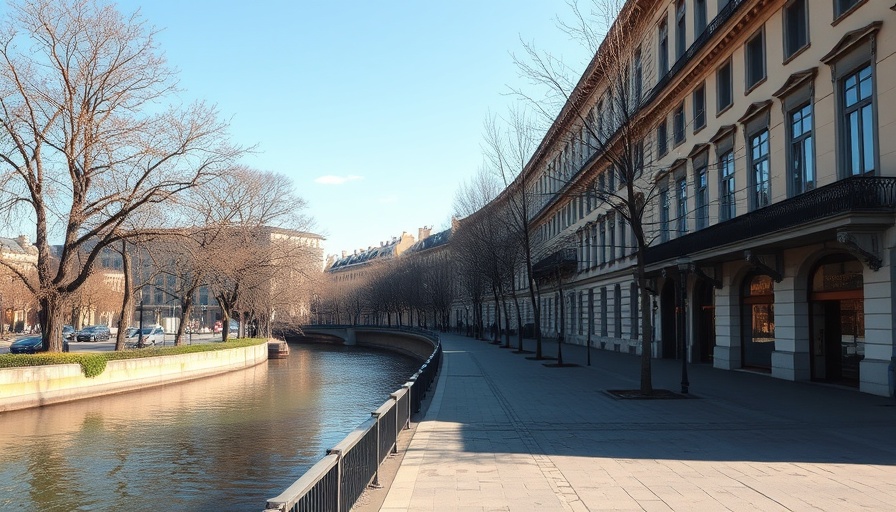
Transforming London's Icon: The Custom House Project
In a bid to elevate the hospitality landscape in London, real estate company Jastar Capital has proposed the ambitious redevelopment of the City of London’s elegant Grade I-listed Custom House into a luxurious hotel. This architectural gem, situated on the north bank of the River Thames, carries a storied history dating back to the early 19th century, originally serving as the headquarters for HMRC until its departure in 2021.
The Vision Behind the Luxury Hotel
According to Jastar Capital, the renovation aims to feature 179 guest rooms alongside a spa, restaurant, café, and versatile event spaces, breathing new life into this historic building. Designed in collaboration with Orms and Richard Griffiths Architects, the project seeks not only to provide high-end accommodation but also to incorporate community-focused elements reflective of the building’s heritage.
A Nod to Historical Architecture
As proposed, the redevelopment will honor architectural details originally designed by architect Robert Smirke, ensuring that the authentic character of Custom House is preserved. Plans include the restoration of period-appropriate features, such as window awnings and improved access to historically significant areas of the building. Such restoration efforts underscore the ambition to create a heritage-led hospitality destination, as stated by Jay Matharu, director at Jastar Capital, who envisions “welcoming community spaces and exceptional dining experiences.”
Balancing Heritage and Modern Needs
However, not everyone is on board. Heritage groups like the Georgian Group and SAVE Britain’s Heritage have raised concerns about the implications of redevelopment on the building's historical integrity. They argue that modifications could dilute the architectural significance that Custom House represents. Notably, a previous redevelopment effort was declined in 2022, highlighting the contentious nature of balancing modernization with preservation.
Local Impact and Community Dialogue
The ongoing conversation surrounding the Custom House project reveals the complexities of urban development in historic locales. Stakeholders are grappling with both the benefits of modern luxury accommodations and the imperative to safeguard historical landmarks. As the urban population continues to grow, the inclusion of unique boutique hotels that contribute to local culture and economic dynamism remains essential.
Broader Trends in Luxury Boutique Hospitality
The proposal for the Custom House aligns with a broader trend towards the development of luxury boutique hotels across urban centers. These establishments aim to provide personalized experiences while promoting a sense of place, often through design showcasing local artistry and history. Recent data indicates an increasing demand for boutique hotels in urban environments, particularly for those seeking curated experiences that reflect their preferred lifestyle. Factors such as design aesthetics, location, and value-added amenities like spas and fine dining have led to a resurgence in boutique offerings, catering especially to travelers looking for an experience beyond the conventional chains.
The Future of Customized Luxury in Hospitality
The transition from traditional hotels to more bespoke accommodations is likely to redefine consumer expectations. As travelers seek unique stays—many even looking for pet-friendly options or romantic escapes—the implications for projects like Custom House are significant. Luxury boutique hotels are not just establishments; they represent a melding of comfortable living with the rich tapestry of local culture and history.
What’s Next for Luxury Boutique Hotels?
If the plans for the Custom House are approved, it could set a precedent for future projects in London and beyond, blending heritage with high-end hospitality. It would be crucial for developers to engage the community throughout the process, ensuring that the project benefits from local input while addressing heritage concerns. As the tourism sector seeks to rebound post-pandemic, the outcome of this redevelopment could inspire a broader strategy in evolving urban landscapes.
Conclusion: The Important Conversation Ahead
As Jastar Capital pushes forward with its ambitious redevelopment plans, the key questions linger: Can the luxury and modernity of a hotel like this coexist harmoniously with the history it embodies? This development not only represents the transformation of a significant building but also symbolizes the ongoing dialogue between progress and preservation in urban contexts. Keeping a balance between these elements will be crucial in determining the success of the project and, indeed, the future landscape of boutique hotels in the capital.
 Add Row
Add Row  Add
Add 




 Add Row
Add Row  Add
Add 

Write A Comment